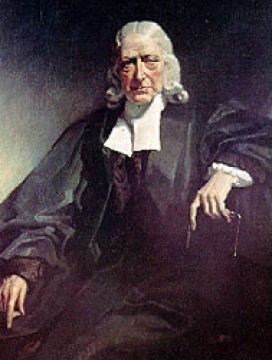Heritage Trail: The Mother Church of Cornish Methodism
The Mother Church of Cornish Methodism
The St Ives Wesley Methodist Church, which has grown upwards and outwards over the centuries, is regularly referred to as the Mother Church of Cornish Methodism as it was considered the birthplace of Methodism in the county. Here housed Cornwall’s first Methodist society as well as its first Methodist chapel.
The original single storey chapel from the 18th century stood on the ground floor of this spot, before growing upwards and outwards. This enlarged building consisted of Wesley Chapel – the dominant Methodist church in St Ives – and Wesley Hall, which was a community space and meeting place for Sunday schools and groups, before the later Wesleyan school (the front building what is now our main accommodation block) was built in 1845.
John Wesley and Methodism
John Wesley is widely credited with founding the Methodist church in the 18th century.
John Wesley was a vicar in the Church of England who felt that the Church was no longer meeting the needs of working people. Instead, heand his brother Charles began their own form of worship, which became known as Methodism. John Wesley was deeply concerned with the intellectual, economic, and physical well-being of the masses. He was a reformist and interested in social reform movements of all kinds. Methodists became leaders in many social issues such as prison reform and abolitionism. He urged the “‘abolition of ‘that execrable villainy’; black slavery”and was why there was a history of the Cornish not putting sugar in their tea as a moral stand against slavery. Methodism became the religion of the people in contrast to Anglicanism, which had been the preserve of the rich.

Early religious societies formed by committed Christians had popped up around the UK from 1678 to promote their own spiritual and moral life and to support charitable causes. These early religious societies became blueprints for the later Methodist societies.
The origins of Cornish Methodism
Cornish Methodism grew out of one of these 18th century religious societies. John Wesley’s message resonated with the Cornish many of whom faced daily dangers working in the mines, out on the seas and farmers threatened by industrialisation.Wesley’s simple message that redemption was open to all and anyone with sufficient faith could be saved offered comfort, security and hope to those who faced daily challenges.
A religious societyin St Ives became Cornwall’s first Methodist society in 1743 and met on this site in a converted dry Housebefore it was later re-built into a single-storey chapel after the meeting room had been destroyed by mob violence.After the establishment of this first Cornish Methodist Society Wesley recorded 34 societies in Cornwall by 1756 and 2,160 by 1767.
Cornish Methodism initially challenged Anglicism teachings and came at a time when there was a real threat of French invasion off the Cornish coast. Local magistrates were apprehensive when they saw societies being formed within the mining populations whose loyalty to the crown they suspected. It was wrongly thought at the time that Methodists were sympathetic to the Jacobite uprising and were in cahoots with the Spanish who had made a pact with the French to co-operate against Britain. For this reason Methodist societies were not initially popular and meetings were often disrupted by mob violence (especially between 1743 and 1745) with people believing they were part of preparations for a French invasion.
As the threat of a French invasion subsided and the mining industry came to prominence, this fuelled the growth of Methodism in Cornwall which took to Methodism like no other county in England. Methodism in Cornwall was established through repeated visits by John Wesley which ensured the county’s reputation as a bastion of Methodist morality.
St Ives: Birthplace of Cornish Methodism
Up until 1743 Methodism hadn’t yet officially entered Cornwall.
In 1743 Captain Steven Turner – a Bristol-based Methodist – sailed into St Ives. It was recorded that Captain Turner walked through the streets of St Ives in disgust. As was common throughout the country, St Ives had a feature ofheavy alcohol consumption.According to one local historian’s account it was probable that Captain Turner would have seen signs around the town which read along the lines of “for a penny we can get you drunk, for a tuppence we can get you very drunk and for a thruppance we’ll throw you a bed to sleep it off”
Two Methodist preachers, Thomas Williams & William Shepherd, were sent to St Ives to ‘help’, ‘assist’, ‘find out about’ this religious society that had been discovered here.These were the first official Methodist preachers in Cornwall and laid the groundwork for the arrival of John Wesley on 30th August 1743.
On the first day of John Wesley’s arrival in St Ives, he spoke to this religious society in a crowded room of about 120 and invited all the ‘guilty, helpless, sinners’ to accept free forgiveness. This religious society soon adopted Methodism and became Cornwall’s first Methodist society.
At the beginning St Ives did not welcome John Wesley and Methodism. He faced considerable hostility encouraged by local magistrates and clergymen. Several times over the next few decades the Methodist meeting house was attacked but each time the Methodists grew back stronger.
In his diaries Wesley wrote a less than flattering observation that smuggling, drunkenness, cockfighting, wrestling, hurling and godless riot werethe favourite amusements of the people of St Ives!
